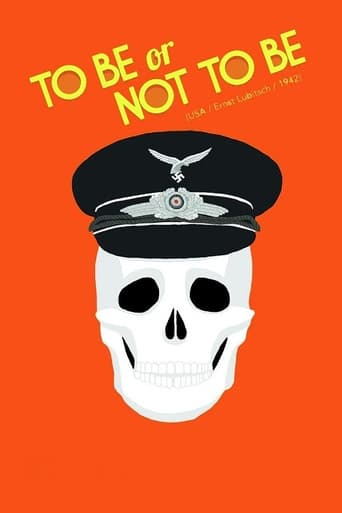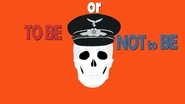alexdeleonfilm
"To Be or Not to Be" starring comedian Jack Benny, 1942 image1.jpeg A wishful thinking absurd wartime comedy about Dumb Nazis and Smart Polaks. Plot: A bad Polish actor is appearing on stage as Hamlet when the war breaks out and Warsaw is occupied by the invading Germans. His wife has had the annoying habit of entertaining young Polish officers backstage during his "To be or not to be" soliloquy. When one of these officers comes back from England on a Secret Mission to thwart the Gestapo the actor takes charge and comes up with a plan for them to harass the Germans and escape to freedom. In 1942 Nazi Germany under Hitle r had conquered most of Europe including France and American morale was at a low point. As a kind of followup to Chaplin's prewar The Great Dictator (1940 prior to America's entry into WWII in Dec. 1941) this was mainly a Jack Benny vehicle. Benny, Jewish, was the most popular American radio comedian of the time and only appeared in a few movies, but this is his one famous leading role and worth a look-see if only for that. His wife in the film, Carole Lombard, was a very popular Hollywood star married to the "King of Hollywood" Clark Gable (Rett Butler in "Gone with the Wind"). Lombard was killed in a tragic airplane crash returning from a troop entertainment tour just before the movie was released. In the film Benny is the Polish ham actor playing Hamlet in occupied Warsaw. He and his theater company dress up as German soldiers to bamboozle the German military command and thwart Gestapo's efforts to wipe out the the Polish underground leadership. At one point Benny impersonates Hitler himself on a visit to Warsaw, phony mustache and all. Director Lubitsch, known for sophisticated comedies, was a refugee from Hitter Germany and obviously relished the idea of making fun of the Nazis on screen but the public at this stage was in no mood for fun and the film, unlike the big success of Chaplin's earlier Dictator, was a flop at the box-office despite the star appeal of Benny and Lombard.In retrospect it can be seen as a World War II Hollywood landmark that is funnier now than it was then. Both comedic and dramatic with certain languors here and there it still stands the test of time fairly well and is certainly a picture of some historical importance. The film was produced by famous British Hungarian film impresario Alexander Korda (The Thief of Bagdad) and the script was written by expatriate Hungarian writer Melchior Lengyel. A digitally restored print was shown in a series or restored classics here in Budapest last month, (October, 2017) Alex, BudapestSent from my iPad
Howard Schumann
In celebrating the 75th anniversary of the release of Casablanca, it is easy to overlook another anti-Nazi film, Ernst Lubitsch's "screwball" comedy To Be or Not To Be, a film that skewered the Nazi cause with equal effectiveness. While not as dramatic or filled with memorable lines and patriotic songs, To Be or Not To Be, like Casablanca, the film features two main Hollywood stars, Carole Lombard and Jack Benny and a love triangle in which romance must be subordinate to a greater cause. Set in Poland just before the German invasion of September 1, 1939, the film opens as a mustachioed man bearing a close resemblance to German Chancellor Adolf Hitler is seen walking alone in the streets of Warsaw.This Hitler, however, turns out to be the actor Bronski (Tom Dugan), a bit-player impersonating the Fuhrer in a play being put on by a Polish theatrical group. Is Hitler "by any chance interested in Mr. Maslowski's delicatessen?" teases the narrator in the opening segment. "That's impossible—he's a vegetarian!" Responding to all the "Heil Hitler" salutes, Bronski asserts "Heil myself" as he walks through an open door. Bronski is playing a secondary role to the famous Polish actor Josef Tura, played by Jack Benny, then a radio star whose trademark straight face and deadpan humor marks the film.Tura's wife Maria, also a popular Polish actress, is played by Carole Lombard who was to meet a shocking death in a plane crash in January, 1942 shortly after the film was completed. In the film, Maria is two-timing her actor husband by romancing a young flyer Lt. Sobinski (Robert Stack) who falls "head over heels" for the actress. The running gag in the film is that whenever Josef is playing Hamlet and delivers the line, "to be or not to be," it is a signal for Sobinski to get up from his seat in the theater and go backstage to meet Maria in her dressing room. It appears that Tura is more upset about his speech being interrupted than what happens behind the curtain.The sudden Nazi invasion, however, puts all romantic trysts on the back burner and the mood shifts to solemn. The plot now becomes more involved with espionage and patriotism than acting when Sobinski, now a pilot for the Royal Air Force, discovers that respected Polish professor Siletski (Stanley Ridges) is a double-agent working for the Nazis. When the Lieutenant returns to Warsaw to eliminate the traitorous professor, Maria and Josef team up to help by launching an elaborate charade to trick the unsuspecting Nazis. While the film takes its name from the famous line in Hamlet, Shylock's monologue from the Merchant of Venice, spoken in front of Nazi swastikas, is recited by Jewish actor Felix Bressart, "Have we not eyes? Have we not hands, organs, senses, dimensions, attachments, passions?" he asks the Nazis, "If you poison us, do we not die?" It is a noteworthy plea for tolerance in the days of rabid anti-Semitism even though the line "Hath not a Jew eyes?" is not spoken. According to Thomas Doherty writing in Tablet magazine, "the word "Jew" was seldom heard on the Hollywood screen, even in war-minded scenarios where the topic of anti-Semitism was front and center." He also quotes film historian Lester D. Friedman saying that "The studio bosses were always—even at this point—afraid of thrusting Jews into the spotlight." Whatever the reason, To Be or Not to Be is marked with the genius of one man, the great Jewish director Ernst Lubitsch who said, "What I have satirized in this picture are the Nazis and their ridiculous ideology," and that the tone and temper of the film "cannot leave any doubt in the spectator's mind what my point of view and attitude are toward these acts of horror." While the film is a broad and biting satire, from the beginning of production in November 1941 to its completion on December 24th, however, events made sure that To Be or Not to Be, as well as Charles Chaplin's The Great Dictator, was no longer a laughing matter.
Alex da Silva
Husband and wife Carole Lombard (Maria) and Jack Benny (Joseph) are the leading lights in a Polish Theatre Company during the outbreak of World War 2. They are currently performing "Hamlet" and soldier Robert Stack (Sobinski), who is obsessed with Lombard and attends all her performances, is there in the audience on every occasion. Lombard and Stack arrange meetings with a pre-determined code. When Benny gives his "To be or Not to Be" soliloquy, that is Stack's cue to get up and leave and go backstage, much to Benny's outrage at someone getting up and leaving during his finest moment! When traitor Stanley Ridges (Professor Siletsky) passes through Poland on his way to deliver a list of names of Polish Resistance members to Hitler, the actors jump into action to prevent him reaching Germany with the list. Can they get away with their daring charades? This film is funnier than I expected and had me laughing out loud on a few occasions. Jack Benny is excellent in the lead role and the whole cast are on form. There are loads of humorous scenes and the film has a great ending to round things off. It's a shame that they cut Carole Lombard's line about what could possibly happen in a plane from the film. This would have given extra poignancy to the film given that she died in a plane crash after making this film. I think the line should have remained in there.Basically, a gang of actors come good and defeat the Nazis through various deceptions. It's lightweight entertainment that really does entertain.
SmileysWorld
We needed laughs in 1942.What better thing to laugh at than the thing that was causing us the most tension at the time,World War II? The production of this film came at a very contentious time,and it paid off.The finished product is one to behold if you like to laugh.While the content being satirized may be dated,the humor is timeless.The only downer,I suppose,at the time was the loss of the film's star,Carole Lombard in a plane crash in January of 1942,well before the film's release.This no doubt put a damper on the film's humor for the audiences of the time,so it had to recover from this setback over time.That it has,and it is a must see comedy classic.







